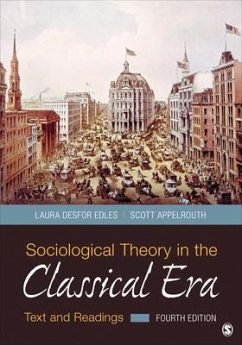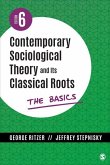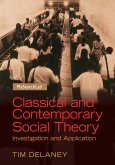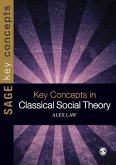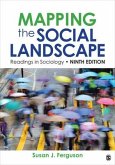- Broschiertes Buch
- Merkliste
- Auf die Merkliste
- Bewerten Bewerten
- Teilen
- Produkt teilen
- Produkterinnerung
- Produkterinnerung
Sociological Theory in the Classical Era, Fourth Edition is an innovative text/reader for courses in classical theory. The new edition of this bestseller expands the explanation of the theoretical framework, includes streamlined primary readings, and features updated examples, statistics and visuals throughout every chapter.
Andere Kunden interessierten sich auch für
![Contemporary Sociological Theory and Its Classical Roots Contemporary Sociological Theory and Its Classical Roots]() George RitzerContemporary Sociological Theory and Its Classical Roots125,99 €
George RitzerContemporary Sociological Theory and Its Classical Roots125,99 €![Sociological Theory Sociological Theory]() George RitzerSociological Theory216,99 €
George RitzerSociological Theory216,99 €![Classical and Contemporary Social Theory Classical and Contemporary Social Theory]() Tim DelaneyClassical and Contemporary Social Theory141,99 €
Tim DelaneyClassical and Contemporary Social Theory141,99 €![Key Concepts in Classical Social Theory Key Concepts in Classical Social Theory]() Alex LawKey Concepts in Classical Social Theory57,99 €
Alex LawKey Concepts in Classical Social Theory57,99 €![Making Sense of the Social World Making Sense of the Social World]() Daniel F ChamblissMaking Sense of the Social World183,99 €
Daniel F ChamblissMaking Sense of the Social World183,99 €![The Classical Tradition in Sociology The Classical Tradition in Sociology]() Jeffrey A. Alexander / Jeffrey C Alexander / Raymond Boudon / Mohamed Cherkaoui (eds.)The Classical Tradition in Sociology1.370,99 €
Jeffrey A. Alexander / Jeffrey C Alexander / Raymond Boudon / Mohamed Cherkaoui (eds.)The Classical Tradition in Sociology1.370,99 €![Mapping the Social Landscape Mapping the Social Landscape]() Mapping the Social Landscape156,99 €
Mapping the Social Landscape156,99 €-
-
-
Sociological Theory in the Classical Era, Fourth Edition is an innovative text/reader for courses in classical theory. The new edition of this bestseller expands the explanation of the theoretical framework, includes streamlined primary readings, and features updated examples, statistics and visuals throughout every chapter.
Produktdetails
- Produktdetails
- Verlag: Sage Publications
- 4th edition
- Seitenzahl: 464
- Erscheinungstermin: 30. Juli 2020
- Englisch
- Abmessung: 254mm x 175mm x 15mm
- Gewicht: 680g
- ISBN-13: 9781506347820
- ISBN-10: 1506347827
- Artikelnr.: 59543622
- Herstellerkennzeichnung
- Libri GmbH
- Europaallee 1
- 36244 Bad Hersfeld
- gpsr@libri.de
- Verlag: Sage Publications
- 4th edition
- Seitenzahl: 464
- Erscheinungstermin: 30. Juli 2020
- Englisch
- Abmessung: 254mm x 175mm x 15mm
- Gewicht: 680g
- ISBN-13: 9781506347820
- ISBN-10: 1506347827
- Artikelnr.: 59543622
- Herstellerkennzeichnung
- Libri GmbH
- Europaallee 1
- 36244 Bad Hersfeld
- gpsr@libri.de
Laura Desfor Edles (PhD, University of California, Los Angeles, 1990) is Professor of Sociology at California State University, Northridge. She is the author of Symbol and Ritual in the New Spain: The Transition to Democracy after Franco (1998) and Cultural Sociology in Practice (2002), as well as various articles on culture, theory, race/ethnicity, and social movements.
List of Figures and Tables
Preface
About the Authors
Chapter 1. Introduction
Key Concepts
What Is Sociological Theory?
Why Read Original Works?
The European Enlightenment
The Ins and Outs of Classical Canons
Discussion Questions
Chapter 2. Karl Marx (1818-1883)
Key Concepts
A Biographical Sketch
Intellectual Influences and Core Ideas
Marx's Theoretical Orientation
Discussion Questions
Chapter 3. Émile Durkheim (1858-1917)
Key Concepts
A Biographical Sketch
Intellectual Influences and Core Ideas
Durkheim's Theoretical Orientation
Discussion Questions
Chapter 4. Max Weber (1864-1920)
Key Concepts
A Biographical Sketch
Intellectual Influences and Core Ideas
Weber's Theoretical Orientation
Discussion Questions
Chapter 5. Charlotte Perkins Gilman (1860-1935)
Key Concepts
A Biographical Sketch
Intellectual Influences and Core Ideas
Gilman's Theoretical Orientation
Discussion Questions
Chapter 6. Georg Simmel (1858-1918)
Key Concepts
A Biographical Sketch
Intellectual Influences and Core Ideas
Simmel's Theoretical Orientation
Discussion Questions
Chapter 7. W. E. B. Du Bois (1868-1963)
Key Concepts
A Biographical Sketch
Intellectual Influences and Core Ideas
Du Bois's Theoretical Orientation
Discussion Questions
Chapter 8. George Herbert Mead (1863-1931)
Key Concepts
A Biographical Sketch
Intellectual Influences and Core Ideas
Mead's Theoretical Orientation
Discussion Questions
Glossary and Terminology
References
Index
Preface
About the Authors
Chapter 1. Introduction
Key Concepts
What Is Sociological Theory?
Why Read Original Works?
The European Enlightenment
The Ins and Outs of Classical Canons
Discussion Questions
Chapter 2. Karl Marx (1818-1883)
Key Concepts
A Biographical Sketch
Intellectual Influences and Core Ideas
Marx's Theoretical Orientation
Discussion Questions
Chapter 3. Émile Durkheim (1858-1917)
Key Concepts
A Biographical Sketch
Intellectual Influences and Core Ideas
Durkheim's Theoretical Orientation
Discussion Questions
Chapter 4. Max Weber (1864-1920)
Key Concepts
A Biographical Sketch
Intellectual Influences and Core Ideas
Weber's Theoretical Orientation
Discussion Questions
Chapter 5. Charlotte Perkins Gilman (1860-1935)
Key Concepts
A Biographical Sketch
Intellectual Influences and Core Ideas
Gilman's Theoretical Orientation
Discussion Questions
Chapter 6. Georg Simmel (1858-1918)
Key Concepts
A Biographical Sketch
Intellectual Influences and Core Ideas
Simmel's Theoretical Orientation
Discussion Questions
Chapter 7. W. E. B. Du Bois (1868-1963)
Key Concepts
A Biographical Sketch
Intellectual Influences and Core Ideas
Du Bois's Theoretical Orientation
Discussion Questions
Chapter 8. George Herbert Mead (1863-1931)
Key Concepts
A Biographical Sketch
Intellectual Influences and Core Ideas
Mead's Theoretical Orientation
Discussion Questions
Glossary and Terminology
References
Index
List of Figures and Tables
Preface
About the Authors
Chapter 1. Introduction
Key Concepts
What Is Sociological Theory?
Why Read Original Works?
The European Enlightenment
The Ins and Outs of Classical Canons
Discussion Questions
Chapter 2. Karl Marx (1818-1883)
Key Concepts
A Biographical Sketch
Intellectual Influences and Core Ideas
Marx's Theoretical Orientation
Discussion Questions
Chapter 3. Émile Durkheim (1858-1917)
Key Concepts
A Biographical Sketch
Intellectual Influences and Core Ideas
Durkheim's Theoretical Orientation
Discussion Questions
Chapter 4. Max Weber (1864-1920)
Key Concepts
A Biographical Sketch
Intellectual Influences and Core Ideas
Weber's Theoretical Orientation
Discussion Questions
Chapter 5. Charlotte Perkins Gilman (1860-1935)
Key Concepts
A Biographical Sketch
Intellectual Influences and Core Ideas
Gilman's Theoretical Orientation
Discussion Questions
Chapter 6. Georg Simmel (1858-1918)
Key Concepts
A Biographical Sketch
Intellectual Influences and Core Ideas
Simmel's Theoretical Orientation
Discussion Questions
Chapter 7. W. E. B. Du Bois (1868-1963)
Key Concepts
A Biographical Sketch
Intellectual Influences and Core Ideas
Du Bois's Theoretical Orientation
Discussion Questions
Chapter 8. George Herbert Mead (1863-1931)
Key Concepts
A Biographical Sketch
Intellectual Influences and Core Ideas
Mead's Theoretical Orientation
Discussion Questions
Glossary and Terminology
References
Index
Preface
About the Authors
Chapter 1. Introduction
Key Concepts
What Is Sociological Theory?
Why Read Original Works?
The European Enlightenment
The Ins and Outs of Classical Canons
Discussion Questions
Chapter 2. Karl Marx (1818-1883)
Key Concepts
A Biographical Sketch
Intellectual Influences and Core Ideas
Marx's Theoretical Orientation
Discussion Questions
Chapter 3. Émile Durkheim (1858-1917)
Key Concepts
A Biographical Sketch
Intellectual Influences and Core Ideas
Durkheim's Theoretical Orientation
Discussion Questions
Chapter 4. Max Weber (1864-1920)
Key Concepts
A Biographical Sketch
Intellectual Influences and Core Ideas
Weber's Theoretical Orientation
Discussion Questions
Chapter 5. Charlotte Perkins Gilman (1860-1935)
Key Concepts
A Biographical Sketch
Intellectual Influences and Core Ideas
Gilman's Theoretical Orientation
Discussion Questions
Chapter 6. Georg Simmel (1858-1918)
Key Concepts
A Biographical Sketch
Intellectual Influences and Core Ideas
Simmel's Theoretical Orientation
Discussion Questions
Chapter 7. W. E. B. Du Bois (1868-1963)
Key Concepts
A Biographical Sketch
Intellectual Influences and Core Ideas
Du Bois's Theoretical Orientation
Discussion Questions
Chapter 8. George Herbert Mead (1863-1931)
Key Concepts
A Biographical Sketch
Intellectual Influences and Core Ideas
Mead's Theoretical Orientation
Discussion Questions
Glossary and Terminology
References
Index

